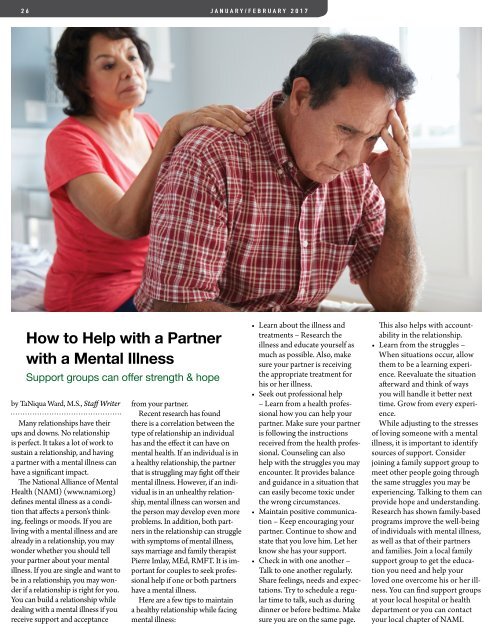Living Well - Jan - Feb 2017
You also want an ePaper? Increase the reach of your titles
YUMPU automatically turns print PDFs into web optimized ePapers that Google loves.
2 6 JANUARY/FEBRUARY 2 0 1 7<br />
How to Help with a Partner<br />
with a Mental Illness<br />
Support groups can offer strength & hope<br />
by TaNiqua Ward, M.S., Staff Writer<br />
Many relationships have their<br />
ups and downs. No relationship<br />
is perfect. It takes a lot of work to<br />
sustain a relationship, and having<br />
a partner with a mental illness can<br />
have a significant impact.<br />
The National Alliance of Mental<br />
Health (NAMI) (www.nami.org)<br />
defines mental illness as a condition<br />
that affects a person’s thinking,<br />
feelings or moods. If you are<br />
living with a mental illness and are<br />
already in a relationship, you may<br />
wonder whether you should tell<br />
your partner about your mental<br />
illness. If you are single and want to<br />
be in a relationship, you may wonder<br />
if a relationship is right for you.<br />
You can build a relationship while<br />
dealing with a mental illness if you<br />
receive support and acceptance<br />
from your partner.<br />
Recent research has found<br />
there is a correlation between the<br />
type of relationship an individual<br />
has and the effect it can have on<br />
mental health. If an individual is in<br />
a healthy relationship, the partner<br />
that is struggling may fight off their<br />
mental illness. However, if an individual<br />
is in an unhealthy relationship,<br />
mental illness can worsen and<br />
the person may develop even more<br />
problems. In addition, both partners<br />
in the relationship can struggle<br />
with symptoms of mental illness,<br />
says marriage and family therapist<br />
Pierre Imlay, MEd, RMFT. It is important<br />
for couples to seek professional<br />
help if one or both partners<br />
have a mental illness.<br />
Here are a few tips to maintain<br />
a healthy relationship while facing<br />
mental illness:<br />
• Learn about the illness and<br />
treatments – Research the<br />
illness and educate yourself as<br />
much as possible. Also, make<br />
sure your partner is receiving<br />
the appropriate treatment for<br />
his or her illness.<br />
• Seek out professional help<br />
– Learn from a health professional<br />
how you can help your<br />
partner. Make sure your partner<br />
is following the instructions<br />
received from the health professional.<br />
Counseling can also<br />
help with the struggles you may<br />
encounter. It provides balance<br />
and guidance in a situation that<br />
can easily become toxic under<br />
the wrong circumstances.<br />
• Maintain positive communication<br />
– Keep encouraging your<br />
partner. Continue to show and<br />
state that you love him. Let her<br />
know she has your support.<br />
• Check in with one another –<br />
Talk to one another regularly.<br />
Share feelings, needs and expectations.<br />
Try to schedule a regular<br />
time to talk, such as during<br />
dinner or before bedtime. Make<br />
sure you are on the same page.<br />
This also helps with accountability<br />
in the relationship.<br />
• Learn from the struggles –<br />
When situations occur, allow<br />
them to be a learning experience.<br />
Reevaluate the situation<br />
afterward and think of ways<br />
you will handle it better next<br />
time. Grow from every experience.<br />
While adjusting to the stresses<br />
of loving someone with a mental<br />
illness, it is important to identify<br />
sources of support. Consider<br />
joining a family support group to<br />
meet other people going through<br />
the same struggles you may be<br />
experiencing. Talking to them can<br />
provide hope and understanding.<br />
Research has shown family-based<br />
programs improve the well-being<br />
of individuals with mental illness,<br />
as well as that of their partners<br />
and families. Join a local family<br />
support group to get the education<br />
you need and help your<br />
loved one overcome his or her illness.<br />
You can find support groups<br />
at your local hospital or health<br />
department or you can contact<br />
your local chapter of NAMI.
















